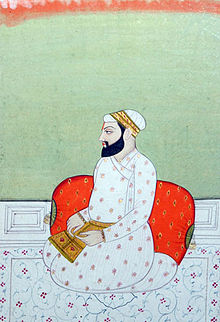
Back الغورو أرجان Arabic Arcan Dev Azerbaijani গুরু অর্জন Bengali/Bangla Guru Arjan Dev Ji Catalan Arjan Dev German Γκουρού Αρντζάν Greek Gurú Arjan Dev Ji Spanish گورو ارجن Persian Guru Arjan French गुरु अर्जुन देव Hindi
Guru Arjan | |
|---|---|
ਗੁਰੂ ਅਰਜਨ | |
 Painting of Guru Arjan by the family atelier of Purkhu of Kangra, circa 1800 | |
| Title | 5th Guru of Sikhism |
| Personal | |
| Born | 15 April 1563 |
| Died | 30 May 1606 (aged 43)[2] |
| Cause of death | Execution |
| Resting place | Gurdwara Dera Sahib, Walled City of Lahore |
| Religion | Sikhism |
| Spouse | Mata Ram Dei Mata Ganga |
| Children | Guru Hargobind |
| Parent(s) | Guru Ram Das and Mata Bhani |
| Known for |
|
| Other names | Fifth Master Fifth Nanak |
| Signature |  |
| Religious career | |
| Predecessor | Guru Ram Das |
| Successor | Guru Hargobind |
| Part of a series on |
| Sikhism |
|---|
 |
Guru Arjan[3][4] (Gurmukhi: ਗੁਰੂ ਅਰਜਨ, pronunciation: [gʊɾuː əɾd͡ʒənᵊ]; 15 April 1563 – 30 May 1606)[2] was the fifth of the ten total Sikh Gurus. He compiled the first official edition of the Sikh scripture called the Adi Granth, which later expanded into the Guru Granth Sahib. He is regarded as the first of the two Gurus martyred in the Sikh faith.
Guru Arjan was born in Goindval, in the Punjab, the youngest son of Bhai Jetha, who later became Guru Ram Das, and Mata Bhani, the daughter of Guru Amar Das.[5][6] He completed the construction of Darbar Sahib at Amritsar, after the fourth Sikh Guru founded the town and built a sarovar.[7][8][9] Arjan compiled the hymns of previous Gurus and of other saints into Adi Granth, the first edition of the Sikh scripture, and installed it in the Harimandir Sahib.[7]
Guru Arjan reorganized the masand system initiated by Guru Ram Das, by suggesting that the Sikhs donate, if possible, one-tenth of their income, goods or service to the Sikh organization (dasvandh). The Masand not only collected these funds but also taught tenets of Sikhism and settled civil disputes in their region. The dasvand financed the building of gurdwaras and langars (shared communal kitchens).[10]
Guru Arjan was arrested under the orders of the Mughal Emperor Jahangir accusing him of supporting a rebellion under Khusrau Mirza.[11][12][7][13] He was asked to convert himself to Islam.[14][15] He refused, was tortured and executed in 1606 CE.[14][16] Historical records and the Sikh tradition are unclear as to whether Arjan was executed by drowning or died during torture.[14] The Sikh tradition states the Guru's execution was a part of the ongoing persecution of the Sikhs under the Mughal Empire.[17][18] His martyrdom is considered a watershed event in the history of Sikhism.[14][19] It is remembered as Shaheedi Divas of Guru Arjan in May or June according to the Nanakshahi calendar released by the Shiromani Gurdwara Parbandhak Committee in 2003.[20]
- ^ Singh, Jasmer (2005). Sri Guru Granth Sahib - A Descriptive Bibliography of Punjabi Manuscripts. Patiala: Punjabi University of Patiala. p. 145.
- ^ a b "Arjan, Sikh Guru". Encyclopædia Britannica. Retrieved 5 May 2015.
- ^ Cite error: The named reference
mb12was invoked but never defined (see the help page). - ^ Dehsen, Christian (1999). Philosophers and religious leaders. Routledge. p. 14. ISBN 978-1-57958-182-4.
- ^ Mcleod, Hew (1997). Sikhism. London: Penguin Books. p. 28. ISBN 0-14-025260-6.
- ^ William Owen Cole; Piara Singh Sambhi (1995). The Sikhs: Their Religious Beliefs and Practices. Sussex Academic Press. p. 24. ISBN 978-1-898723-13-4.
- ^ a b c Christopher Shackle; Arvind Mandair (2013). Teachings of the Sikh Gurus: Selections from the Sikh Scriptures. Routledge. pp. xv–xvi. ISBN 978-1-136-45101-0.
- ^ Pardeep Singh Arshi (1989). The Golden Temple: history, art, and architecture. Harman. pp. 5–7. ISBN 978-81-85151-25-0.
- ^ Louis E. Fenech; W. H. McLeod (2014). Historical Dictionary of Sikhism. Rowman & Littlefield Publishers. p. 33. ISBN 978-1-4422-3601-1.
- ^ DS Dhillon (1988), Sikhism Origin and Development Atlantic Publishers, pp. 213-215, 204-207
- ^ Cite error: The named reference
:1was invoked but never defined (see the help page). - ^ Cite error: The named reference
Gandhiwas invoked but never defined (see the help page). - ^ Cite error: The named reference
:2was invoked but never defined (see the help page). - ^ a b c d Cite error: The named reference
ps5was invoked but never defined (see the help page). - ^ Cite error: The named reference
lkcawas invoked but never defined (see the help page). - ^ Cite error: The named reference
thackstonwas invoked but never defined (see the help page). - ^ Cite error: The named reference
:3was invoked but never defined (see the help page). - ^ Louis E. Fenech, Martyrdom in the Sikh Tradition, Oxford University Press, pp. 118-121
- ^ Cite error: The named reference
whmwas invoked but never defined (see the help page). - ^ Eleanor Nesbitt (2016). Sikhism: a Very Short Introduction. Oxford University Press. pp. 6, 122–123. ISBN 978-0-19-874557-0.
© MMXXIII Rich X Search. We shall prevail. All rights reserved. Rich X Search